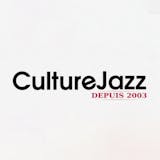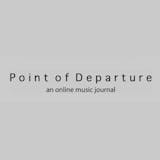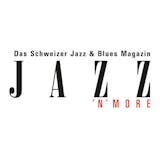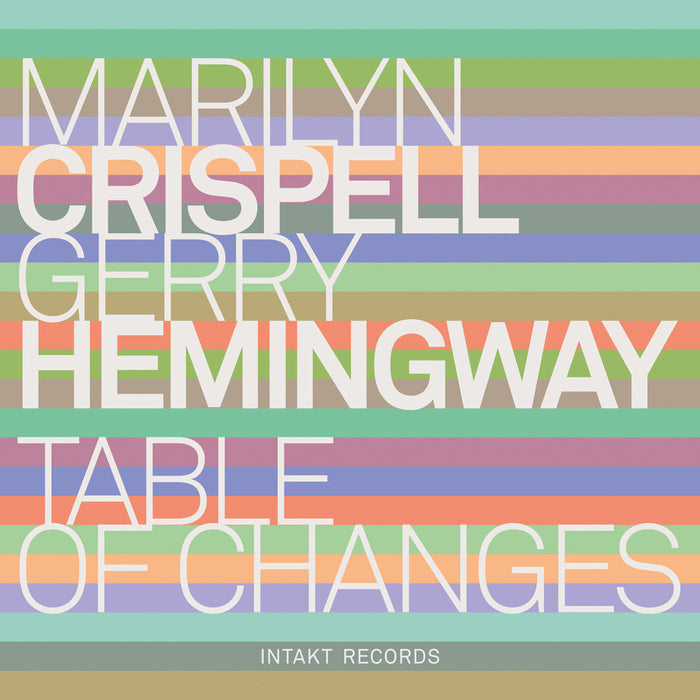
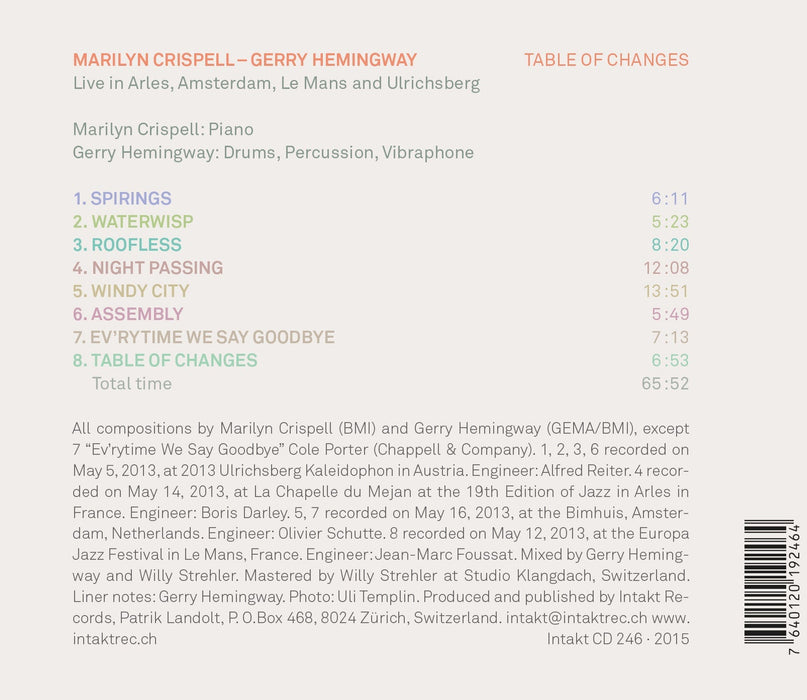
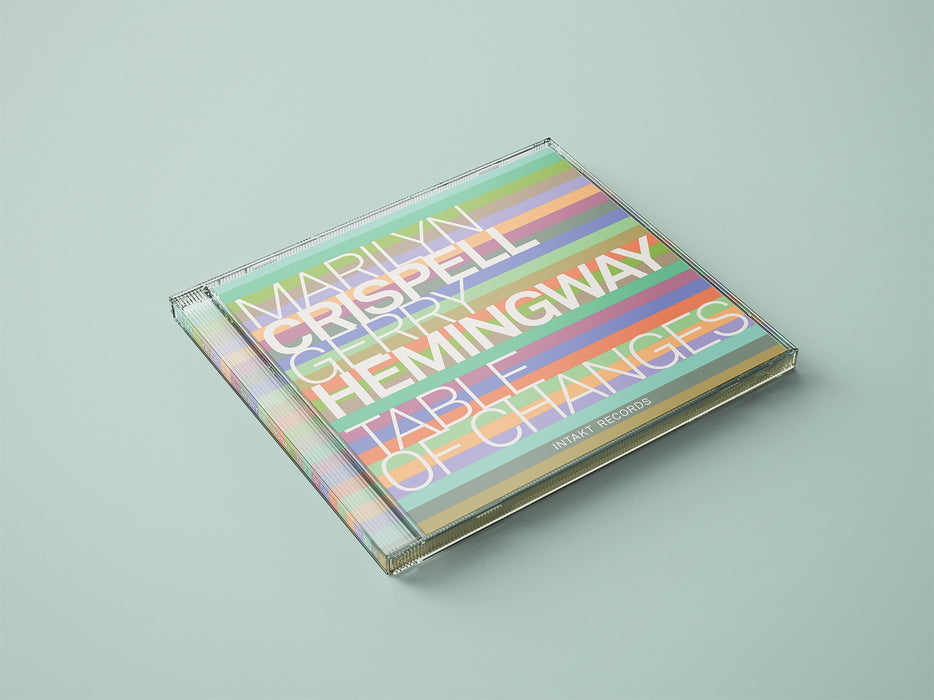
246: MARILYN CRISPELL – GERRY HEMINGWAY. Table Of Changes
Intakt Recording #246 / 2014
Marilyn Crispell: Piano
Gerry Hemingway: Drums
Recorded 2013 live at: Ulrichsberg Kaleidophon, Austria / The 19th Edition of Jazz in Arles, France / The Bim Huis, Amsterdam, Netherlands / The Europa Jazz Festival, Le Mans, France.
More Info
In the summer of 2013 the duo of Marilyn Crispell (piano) and Gerry Hemingway (drums) played at a number of prestigious festivals all over Europe. On their new album “Tables of Changes“ some of the highlights of these performances are documented and put together as a coherent unit. With this album they continue their musical dialogue („Affinities“, Intakt CD 177).
The musical partnership of Crispell and Hemingway goes back to the 80’s, when they played together in a variety of Anthony Braxton’s ensembles. In 1992 they began touring as a duo.
On the new release their interaction is subtle – they meet as equals. There is no virtuosity for its own sake. The music ranges from delicate sound meditations to wild explosions, and from wonderful melodies to passionate improvisations. The two play with such understanding and intuition – as though they were twins.
Album Credits
Liner notes: Gerry Hemingway
Photo: Uli Templin
Recorded 2013 live at: Ulrichsberg Kaleidophon, Austria /
The 19th Edition of Jazz in Arles, France / The Bim Huis,
Amsterdam, Netherlands / The Europa Jazz Festival, Le Mans,
France. Mixed by Gerry Hemingway and by Willy Strehler. Mastered by Willy Strehler at Studio Klangdach, Switzerland.
Seit Jahren steht Marilyn Crispell für ein fast ephemeres Piano, sensibel aufgezeichnet vom ECM-Label. Aber einige werden sich noch daran erinnern, dass die aus Woodstock (NY) stammende Pianistin mehr als 10 Jahre, zusammen mit dem Bassisten Mark Dresser und dem Drummer Gerry Hemingway, zum „revolutionary Anthony Braxton Quartet“ gehörte.
Ihr explosives intuitives Spiel, in der Tradition eines Cecil Taylor, festigte Crispells Ruf, als innovativste Pianistin des Free Jazz. Die acht Stücke auf „Table of Changes“ bekennen sich explizit zu dieser Vergangenheit.
Neues Niveau
Live mit Hemingway (Schlagzeug, Percussion, Vibraphon) bei vier verschiedenen Konzerten aufgenommen, hebt Crispell ihre Kunst allerdings auf ein neues Niveau. Es gibt absoluten Absturz, fast zärtlich sinnsuchende Momente und dann wiederum kathartische Eruptionen.
Liebhaber der Jazzavantgarde werden auf ihre Kosten kommen. Vor allem aber bezeugen diese 66 Minuten, mit welcher Brillanz und Klarheit Crispell und Hemingway ihre Message von Liebe, Befreiung und Empathie transportieren können.
Inzwischen kann Marilyn Crispell guten Gewissens in einem Atemzug mit Toshiko Akiyoshi, Irène Schweizer, Paul Bley oder Cecil Taylor genannt werden.
Denn ihre ungezügelte und trotzdem behutsame Interaktion mit Gerry Hemingway zeigt, dass heute selbst die Hälfte des Himmels genug Zentrifugalkräfte beinhaltet, um alle Maßstäbe durcheinander zu wirbeln.
https://www.klenkes.de/kultur/tontraeger/musik-des-monats/artikel/71555.marilyn-crispellgerry-hemingway---table-of-changes
Enfin, nous sommes toujours heureux de retrouver ce beau duo de vingt ans, Marilyn Crispell (piano) et Gerry Hemingway (batterie, percussion, vibraphone), qui ne s'attache qu'à l'essentiel : une musique totale, remarquable et passionnante : « Table of Changes »
http://www.culturejazz.fr/spip.php?article285
Marilyn Crispell’s ECM recordings, including duets with bassist Gary Peacock and trio sessions that added Paul Motian, revealed the more delicate, lyrical side of the pianist’s playing, which both complemented and contrasted her prior work in true-blue free jazz. Reuniting with drummer Gerry Hemingway, a longtime bandmate in her earlier trios and in Anthony Braxton’s quartet, puts Crispell back on a thoroughly avant-garde track, and the final product sounds nothing less than joyful. The two longtime friends met up on a European tour two years ago, and this disc captures highlights from those performances.
Crispell takes the knotty influence of Cecil Taylor and switches out some of the percussive attack for more pensive melodic moments. After the opening blast of “Spirings,” the dynamics shift and Hemingway moves from his kit to the vibraphone for droning tones on the gentle “Waterwisp.” The duo uses this same instrument combination on “Assembly,” with the vibraphone’s longer phrases standing starkly against Crispell’s brief clusters of notes.”Ev’rytime We Say Goodbye,” beginning with just a series of sustained piano chords, slowly reveals itself. Hemingway adds only the sparest of percussive accompaniment, putting the song in a new light and also making a statement about how dear friends feel at the end of two weeks of deep onstage discussion. It’s bittersweet, not maudlin, plumbing emotional depths even in its simplicity.
https://jazztimes.com/reviews/albums/marilyn-crispellgerry-hemingway-table-of-changes/
Marilyn Crispell has long relished playing duets with percussionists, as her earlier discs with Gerry Hemingway, Louis Moholo- Moholo and Eddie Prévost testify. She and Hemingway first worked together in Anthony Braxton's 1980s quartet and have been performing sporadically as a duo since 1992. Table of Changes, their second Intakt CD, comprises seven improvised selections from their May 2013 European tour, recorded variously in Austria, France and Holland. There is, in addition, a stark, jolting version of Cole Porter's Ev'rytime We Say Goodbye. The pair excel at rhythmic intensity, bringing torrential power to Spirings and Roofless, yet they are equally adept at the delicate interplay of colours and textures on Waterwisp and the pointillistic piano/ vibraphone pitter-patter of Assembly. The longer pieces, Night Passing and Windy City, are probing excursions into freeform lyricism.
Although Table of Changes is only the third release from the pairing of pianist Marilyn Crispell and percussionist Gerry Hemingway, it comes relatively hot on the heels of Affinities (Intakt, 2011) which broke a long silence since Duo (Knitting Factory, 1989). The paucity of these occurrences belies an extensive shared tenure, both as part of reedman Anthony Braxton's classic quartet from 1984 through until 1992, and in regular hook ups thereafter. In tandem they plumb the extremes of intent exhibited by the pianist's touchstones, from Cecil Taylor inspired full-blooded fury to Bill Evans/ Paul Bley style meditation. Although by this juncture of course those influences have been long transcended and what you get is pure Crispell.
Contrapuntal interplay proliferates, not only between the two protagonists, which is a given in the stripped back format of a duet, but also as an integral ingredients of each individual's expression on what are multiple voiced instruments. By way of illustration, at times Crispell juxtaposes dark bass register counter arguments against her lean left hand runs, while Hemingway interweaves gong strikes within a snare drum commentary. Such added layers of complexity promise near orchestral possibilities. Hemingway extends the approach even further as he ranges beyond his standard kit to incorporate vibes and other percussive devices into the jointly improvised flow. However in spite of his virtuosity, Crispell remains the dominant storyteller here.
Comprising eight pieces selected from a series of concert performances in May 2013, the album celebrates the near telepathic communication between these two masters. "Spirings" serves as an emphatic opener and one which demonstrates the emotional volatility which pervades the program. It's more a robust exchange of views than a relaxed chat. Such is the elemental power of their fiercely reiterated motifs, that heavy metal head shaking might be an appropriate response, before a reflective coda with Hemingway on vibes leads into the sparkling shimmer of "Waterwisp."
However between that assertive start and the similarly bracing closing title track the selections are programmed to reveal a common language, rich in harmony and texture, which creates a pleasing narrative arc. "Night Passing" and "Windy City" share a lot of similarities of mood and pacing. Each cut slowly unfolds and blossoms: the former into dramatic ringing clusters and spare lyricism which hints at meter but never entirely commits; and the latter into austere ballad tracts. That bountiful feel is accentuated by a wonderful version of Cole Porter's "Ev'rytime We Say Goodbye" in which barely suppressed energy chafes at the lush valedictory melancholy. It's the highlight of an outstanding recital.
https://www.allaboutjazz.com/table-of-changes-marilyn-crispell-intakt-records-review-by-john-sharpe
Anyone reading this likely knows how much history and affinity there is between pianist Crispell and percussionist Hemingway, not just their obvious connection in the Braxton quartet but through long experience as a duo, both in live performance and on record (like their previous date on Intakt, Affinities). Crispell, no stranger to percussion duos, and Hemingway did a number of dates across Europe during 2013’s festival season, and Table of Changes gives a good accounting of what they were up to on several of these dates, presenting the range of their individual and collaborative languages.
Things are tense and muted at the outset of “Spirings,” which unfolds with prepared piano, low thudding, and spider-walk lines that lead into rougher and more spiky territory. Even in these opening minutes, we’re reminded of the power of this pairing, as they locate tasty contrasts in both texture and tonal register even in the thick of intense energy. At times they linger in one of these areas, as in the absolutely gorgeous “Waterwisp,” where Hemingway creates a wet finger on glass drone with his vibes, met with brilliantine lyricism from Crispell, who also knows just when to play a single, oh-so-apt lower register note, like a stone into water.
Many of the pieces seem to me about subtle moments of transmutation, the breaking down or coalescence of things found in nature. The soft toms and cymbals of “Roofless” sound like a darkening atmosphere that erupts with Crispell’s jabs and flurries, which almost escape gravity. The lovely ice fragments and shimmering vibes on “Night Passing” seem to push into the kind of Bley-derived dark rhapsody that Crispell has often explored lately. “Windy City” is especially effective in this area, moving from lush abstract ballad – where Hemingway lays cross-cutting patterns against a chord progression that sounds both inevitable and wholly spontaneous – until Crispell boils down her playing to a single low note, while Hemingway deconstructs his kit until he can only vocalize into a drum head.
It’s a detailed, absorbing program of music. But to my ears, the very best stuff is on the last third of the disc. “Assembly” is a percussive vibes piece, with Crispell and Hemingway interweaving spiky and spacious lines with taut intervals. There’s a sheerly beautiful reading of “Ev’rytime We Say Goodbye,” which the duo approaches via long abstraction, even if it’s heart on sleeve throughout. And the rousing closer sounds as if two Crispells are playing at once, skulking left hand and probing right, with Hemingway shadowing a micro-second behind, creating tension expertly. It’s a glorious hour from two of my favorite musicians, filled with lovely and unexpected moments.
https://www.pointofdeparture.org/PoD52/PoD52MoreMoments2.html
Freie Improvisation wir benutzen diesen Begriff, als handle es sich dabei um ein musikalisches Genre. Doch geht es dabei nicht eher um ein Verhältnis des Ausführenden zu seiner Musik, das im Ohr zu völlig unterschiedlichen Ergebnissen führen kann? Oder was haben die Improvisationen von Peter Brötzmann und Keith Jarrett sonst ge- meinsam? Die amerikanische Pianistin Marilyn Crispell unterscheidet sich von den meisten anderen Vertretern der freien Improvisation nicht nur durch ihren persönlichen Ton, sondern durch eine grundsätzlich entgegengesetzte Haltung.
Zu den Mythen der Improvisation gehört cs, den Moment zu spielen. Marilyr Crispell setzt diesem Prinzip das Spiel in der unendlichen
Ausdehnung entgegen. Ihr spielerischer Augenblick ist niemals Icsgelöst von einem Anfang, der lange zurückliegt, und einem Ziel in weiter Ferne. Und während sie spielt, dehnen sich diese beiden Pole immer weiter aus. Wie bei einem Farnblatt, dessen Mikrostrukturen stets eine Abbildung des Ganzen sind, bildet sich bei der Pianistin im spielerischen Punkt stets ihr Lebenswerk ab. Muskelspielereien, die in diesem musikalischen Umfeld leider zum unangerehmen Normalfall geworden sind, wird man bei ihr nicht finden. "Man kann das aber nicht planen", versucht die bescheidene Musikerin tiefzustapeln, "denn es hängt von so vielen Faktoren ab, wie dem Publikum, dem Raum, dem Piano, den Musikern, mit denen du spielst, nicht zuletzt meiner eigenen Verfassung an dem betreffenden Tag und meinem Leben als Ganzes. All das kommt in dem einen Moment zusammen."
Doch das allein ist es nicht. Marilyn Cris- pell erliegt niemals der Versuchung, sich über die Quantität ihrer Anschläge zu definieren. Es geht ihr nicht darum, den Raum mit so vielen Tören wie möglich vollzustopfen, sondern je der einzelne Ton wird bei ihr geboren, zogen und zu einem eigenständigen Leben in die Welt geschickt. Jede Note hat Bedeutung und all diese Bedeutungen ergeben im Kontext eine Geschichte. "Ich spiele stets mit Intention. Das ist jedoch nicht gleichbedeutend mit Kontrolle. Es ist viel mehr mit einer meditativen Komponente vor Anwesenheit vergleichbar. Als ich klassische Musik spielte. dachte ich während des Spiels zum Beispiel darüber nach, was es zum Abendessen geben wird. Das passiert mir nicht, wenn ich im- provisiere. Ich bin total präsent. Ich gebe den Dingen ihren Lauf, basierend auf all den Erfahrungen, die ich in der Musik bisher sam- mein konnte, seit ich sieben war. All das ist da, wenn ich spiele."
Womit wir boi Marilyn Crispolls Laufbahn wären. Ihre Anfänge sager viel über ihre Klang-kultur. Sie begann mit sieben Jahren Klavier zu spielen und fühlte sich zunächst der Klassik zugetan. 1968 schloss sie ihr Musikstudium ab, schlug aber erst einmal eine medizinische Laufbahn ein, bevor sie sich unter dem Einfluss von Karl Berger, Roscoe Mitchell und vor allem Anthony Braxton dem Jazz und der freien Improvisation öffnete. Alle drei Kompo- nenten haben sich bis heute in ihrem Spiel orhalten. Sic wirkt nic wic cinc Musikerin, dio spielen muss. Marilyn Crispell umweht die Aura einer Künstlerin, die spielen darf, weil sie sich jedes Mal wieder wie am Beginn ihrer Laufbahn aus freien Stücken dazu entscheidet. Die Klassik-Erfahrung hat sich bis heute auf ihre Tongebung nicdergeschlagen. Jodo Note wird formuliert und mocelliert, alles ist spontan und intuitiv, nichts jedoch zufällig, weil allem eine innere Notwendigkeit zugrunde liegt. Was nicht notwendig ist, kann weggelassen werden. Auf diese Weise fliessen bei der Pianistin Pragmatismus und Romantizismus auf eine sehr persönliche Weise zusammen.
Und schliesslich Arthony Braxton. Zehn Jahre lang hat sie seinem Quartett angehört. Braxton setzte sich mit seinem kammermu- sikalischen Zugang schon in den Hochzeiten des Free Jazz über den Männlichkeitskult vieler seiner Kollegen hinweg. Die Pianistin wirkte in seiner Umgebung teilweise fast wie ein maskulines Korrektiv zu dem Saxophonisten. Sie selbst gibt heute zu, es damals als Kompliment empfunden zu haben, wenn ihr bescheinigt wurde, wie ein Mann zu spielen. In den 1980er-Jahren bedeutete es für eine improvisierende Pianistin noch etwas anderes als heute, sich in der patriarchalischen Jazzwelt durchzusetzen. Jüngere Kolleginnen wie Myra Melford oder Kris Davis haben ihr viel zu verdanken. Es kostete sie viel Zeit, Überwindung und Selbstreflexion, ihre Weiblichkeit zuzulassen. Doch ihr Album "Hyperion" (1995) aufgezeigt, dass sie mit ihrer unaufdringlichen Art selbst einem Fundamentalisten wie Peter Brötz- mann eine gewisse Geschmeidigkeit abringen kann.
Marilyn Crispell hat die seltene Gabe, sich einzulasser, und dieses Einlassen geht über einzelne Produktionen und singuläre Konzerte hinaus. Das hat viel mehr mit Persönlichkeiten als mit musikalischen Auffassungen zutun. Ihr Album "Interference" zum Beispiel, das sie ebenfalls 1995 im Duc mit Tim Berne aufnahm, zeugt bereits von genau der gleichen Dialogkultur wie ihre jüngste Produktion 'Table of Changes" i...
Só para contrariar, classificava- -se o que ao piano fazia Marilyn Crispell como o resultado de uma patologia de diagnóstico particularmente difícil. Em mar- ço de 1998, no "Piano Jazz" (o programa de Marian McPartland na rádio pública norte-americana), a anfitriã confessava nem sempre perceber lá muito bem o que se estava a passar. Depois tocaram em conjunto 'All The Things You Are' e a radialista interrogava-se como é que era possível Crispell estar "tão fora" num instante para logo de seguida se mostrar "tão dentro" da tradição. "São coisas que em mim convergem", respondia-lhe a convidada. Mas a verdade é que, desde então, em consequência de criogénicas gravações na ECM, tudo isso são coisas que se têm mantido em separado. Longe vai o tempo das obras-primas na Leo, o de "For Coltrane", "Gaia" ou "Santuerio", em que até as ações de Crispell - quando fazia workshops em Woodstock, por exemplo - pareciam possuir a concisão e a objetividade da poesia. Por sinal, o tempo em que era continuamente comparada a Cecil Taylor por aquele tipo de críticos que, se fossem ao circo, não seriam capazes de ver para lá do pelo na cara da mulher barbuda. De "Table of Changes", registado em maio de 2013 numa digressão europeia com o mais empático dos seus colaboradores, dir-se-ia ser o ponto em que toda esta história de novo coalesce. Organiza-se sob o signo da descontinuidade, mas também dos encontros casuais, é prenhe em alterações de humor, revela algum cansaço e mais afeto. Um momento monótono? As oito repetições da mesma nota em "Ev'ry Time We Say Goodbye". Mas aí a culpa é por Cole Porter.
As American percussionist Hemingway states in the liner notes, he and compatriot Crispell have now played well over 100 concerts together. They have been touring as a duo since the early 1990s; before that, they both spent a significant period in the orbit of Anthony Braxton. They've both played with bassist Reggie Workman too. The impression, on seven of their own (presumably at least in part spontaneous) compositions, plus one Cole Porter number, is of two musicians on absolutely the same wavelength. It's appealingly unpredictable at any given moment, Crispell moving from Cecil Taylor territory to ruminative passages and angle-poise melodies, while Hemingway is by turns sensitive and robust behind the kit. Despite such breadth, the album is cogent and coherent, the sense of focus and conceptual unity continuing even when Hemingway - most of the time playing the same drum kit he has owned since the age of 10 augments the sound picture with shimmering vibes.
GERRY HEMINGWAY würdigt in seiner kleinen Einführung zu Table of Changes (Intakt CD 246) endlich auch mal die "andere Hälfte unserer musikalischen Familie", nämlich die ja tatsächlich oft familiären Gastgeber und Veranstalter, ohne die der eine Teil - er und seine langjährige musikalische Partnerin MARILYN CRISPELL - und das Publikum nicht so schön zusammenfänden. Der Schlagzeuger aus Connecticut, der heuer 60 wurde, lehrt seit 2009 an der Hochschule Luzern, schweizerisch verankert, international vernetzt. Wir hören das Duo im Mai 2013 im Bimhuis in Amsterdam und auf den Festivals in Arles, Le Mans und Ulrichsberg. Schlagzeug und Piano, nach oben offen, unten ohne Netz. Mit Ecken und Kanten verzahnt bis hin zum Krawall, wobei die größere Wucht, der stärkere Druck sogar von Crispell ausgeht, mit heftigen Schlägen, kickenden Hieben, mit zuletzt aber verkaterten Nachwehen. Die klimprig-kristallin überleiten zu 'Waterwisp', einem nixenhaften Beinahenichts, da Hemingway nur feine Vibestupfen pingt. Nur mit einem Finger stupsen sich die beiden helle Tönchen zu und werden dabei immer neckischer. 'Roofless' beginnt Hemingway allein mit simplen Beckenschlägen und Tomtamtam. Nach zwei Minuten ruft die gewachsene Komplexität heftige Pianopunches hervor und rumpelige Bodychecks mit spritzigen Speedlines. 'Night Passing' steht im starken Kontrast dazu als träumerisches Notturno mit mehrmals gesteigerten Erregungszuständen und Sounds wie von einer singenden Säge und nuancenreichem Cymbalgetickel. Klirrende Becken suggerieren zu nachdenklich bummelnder Crispellei 'Windy City'. Stöhnt Hemingway da zuletzt zu dumpfen Basstupfern durch eine Mundharmonika, eine Bluesharp? 'Assembly' ist ein wieder neckisches, accelerierendes Regentropfentänzchen über Vibes und Keys. Cole Porters 'Ev'rytime We Say Goodbye' wird von Crispell melancholisch geseufzt, Hemingway gibt sich mit ironischem Schnickschnack distanziert. Doch seine Partnerin behält auch beim Titelstück das Bonjour-Tristesse-Feeling bei, findet aber aus dem Konflikt von Linker und
Rechter über Stock und Stein zu einem rasanten, hemingwayesk bepolterten Groove.


